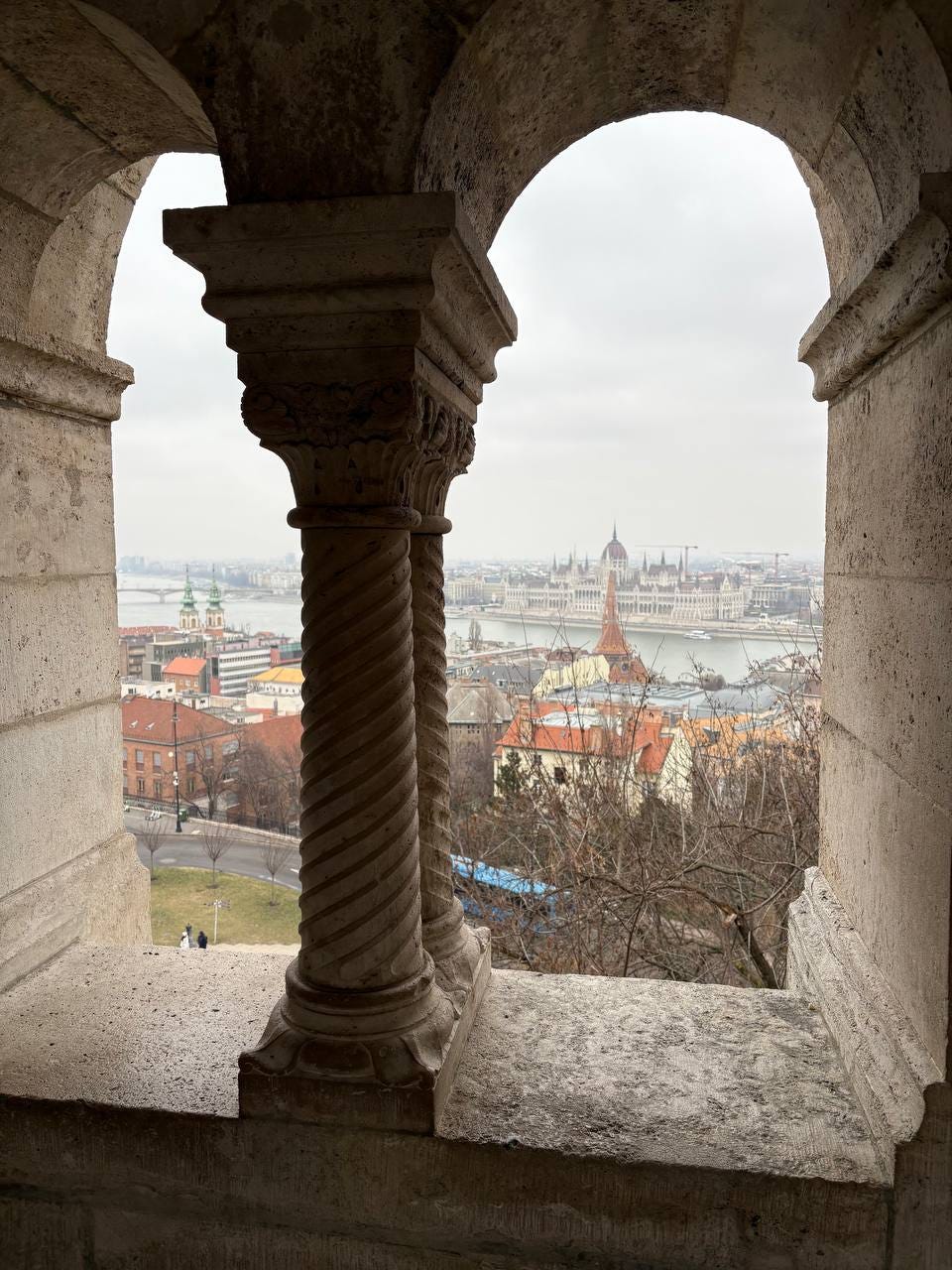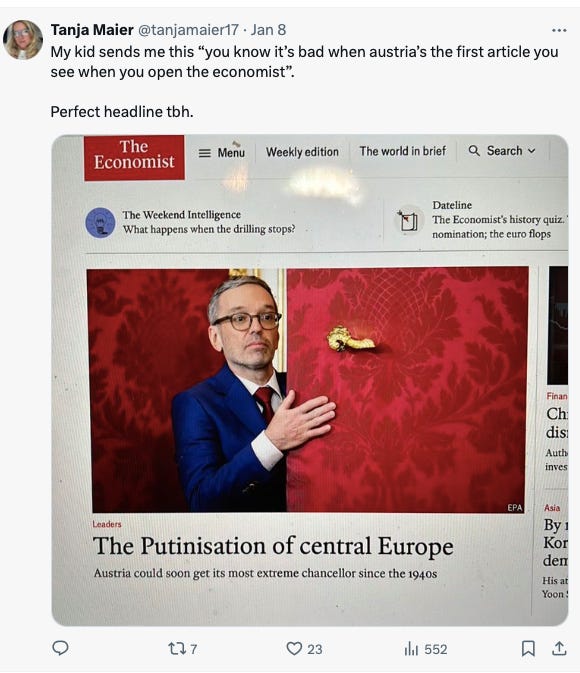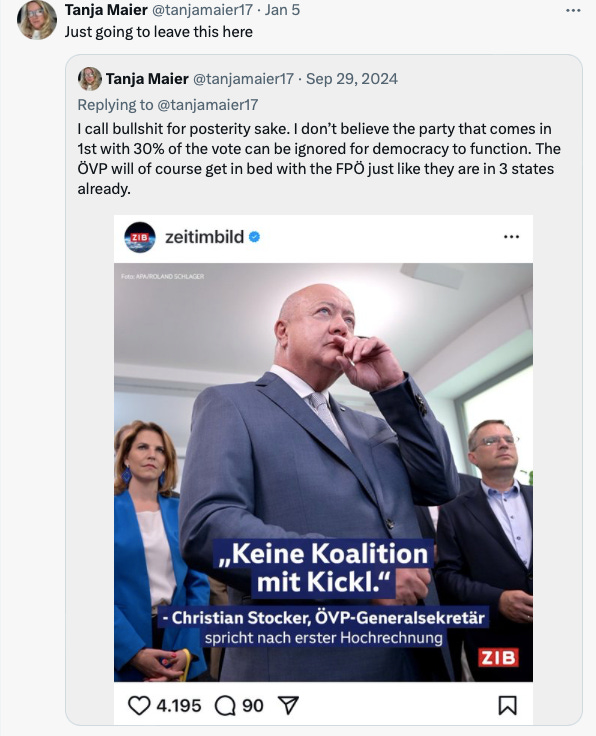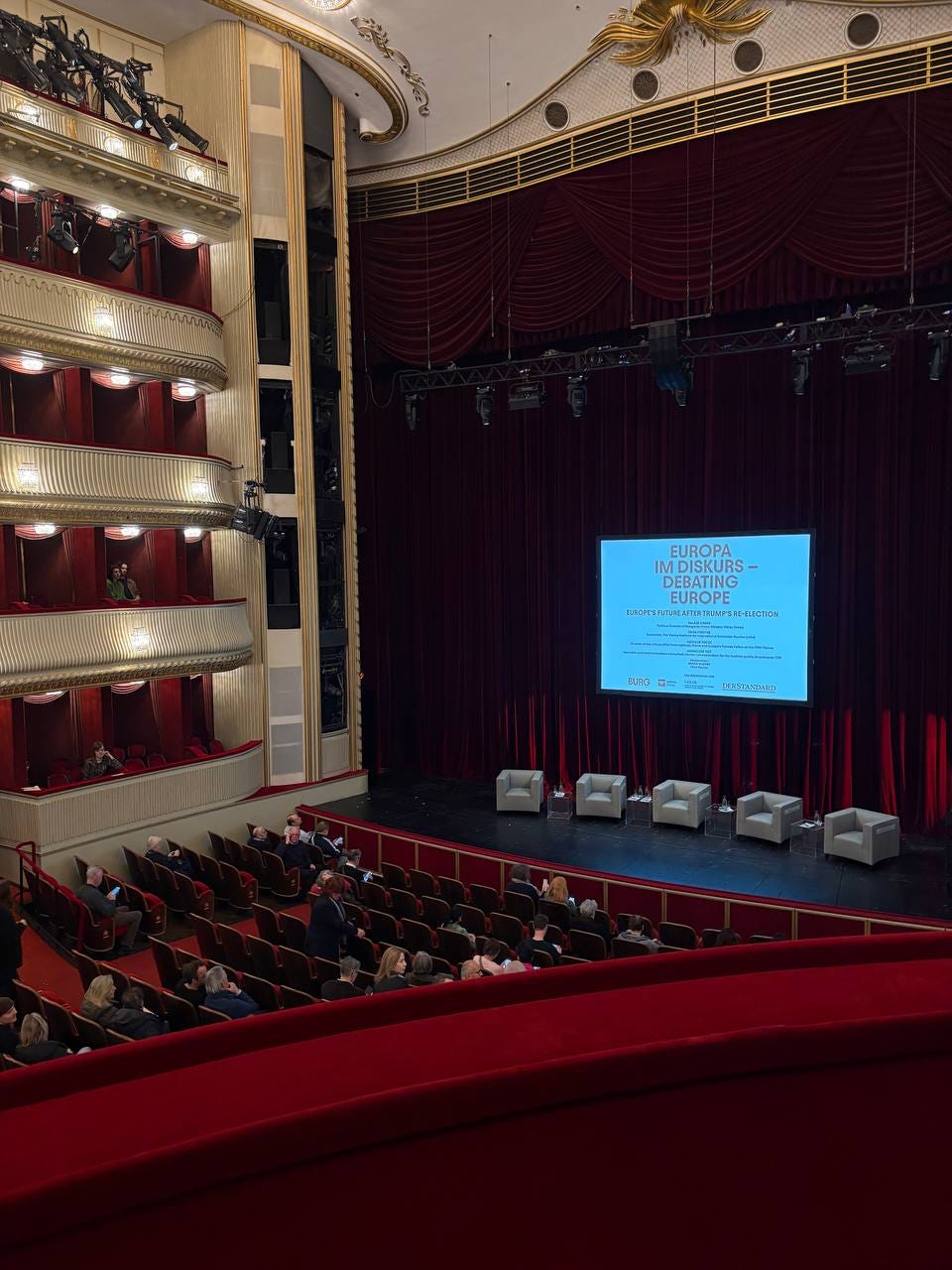Budapest & beyond
A day trip last weekend plus an interesting lecture today on the future of Europe in a Trump-Musk world, featuring commentary by Orban's top political advisor.
As a lover of airports and generally changing the scenery when things get frustrating, sometimes a train station is the next best thing. Last Sunday, we bought cheap tickets to Budapest on Czech-owned trains (cheaper and nicer inside than those operated by the Austrian state railroad), and a few hours later we emerged onto the subway and streets of freezing cold Budapest. It was eye-opening for me in the sense that you see what central Europe is emerging into in real time: architecturally compelling cities whose central streets once housed citizens and now house tourists, in varying degrees of repair and/or decay. In the case of Budapest, it struck me as much in need of paint compared to Prague. We visited the worst, most overcrowded Starbucks in the world (in the Hilton by Fisherman’s Bastion). We marvelled at the public transport app (€12 unlimited day pass for up to 5 people for all subways/trams/buses). As we walked to our lunch destination, a tourist trap we remembered from a previous visits — my kids wanted to eat the same sandwich for sentimental reasons, we passed an extremely long line of dozens of desperate looking adults waiting for a food bank handouts and a soup kitchen, smack in the middle of the historic Jewish district, a mecca for drunk backpackers in summer. The line took me completely by surprise. And then I started to pay more attention.
Walking along one of the main shopping streets, next to the opera, I noticed empty store fronts, and only two luxury brands still hanging on. In general, Orban’s Budapest looks a bit like it is trying to hold onto the past without being sure where it is going from here. It felt both modern: on certain shopping streets in the very center, one could easily mistake it for Vienna, with the benefit that those stores actually were open on a Sunday, and it also looked like a city that was lacking something to boost its economic prospects. We walked past a pillar covered in advertising posters. One featured Orban smiling proudly on the cover. It struck me as actually incredible how the autocratic (he would say popular) leader of one tiny EU nation with no real natural resources to speak of hand thrust himself onto the world stage by kissing up to the likes of Trump and Putin, and simply being a counterweight to the prevailing western liberal-democratic tendencies of the moment. All while still taking EU money. You had to hand it to him, he had played well the hand he was dealt, although the streets of Budapest, I felt, told more of the real economic story. It didn’t look very promising.
I remembered what they say about press freedom in Hungary. You notice immediately the nearly all-white faces on the subway. The museum was busy on a Sunday, well-attended by locals and visitors alike. The online ticket app was annoying but worked. The outdoor ice rink, the largest in Europe in the neighbouring park, closed for two hours in the middle of the afternoon so the Zambonis could do their thing. This reminded me of communism, as did the museum staff who warned we should not dare “carry” our coats: wear them or check them in. We nodded in silence. When we needed a toilet we walked bravely in a five-star hotel and spoke loud, American English. We were met with the stern-looking faces of overly doped bodyguards. Crony capitalism looks the same everywhere even as the languages change.
We arrived back in Vienna that same evening, and I wondered if something similar would happen to Austria under Kickl.
Since I last wrote, Austria’s president invited the leader of the winning far right party to enter into talks to form a government, and the conservatives took up that invitation, despite having said for months they would not do it. Of course they did. I wrote about that in the end of September, when I saw this Instagram post and nearly spit out my coffee. So I am not particularly surprised or even emotional about the whole thing, but there have been significant protests in Vienna in the name of “democracy” against the idea of a far right chancellor. The thing is, and why I don’t feel I can stand next to them: the far right won the vote. Democracy does mean the winner gets to govern. It cannot mean the winner gets to govern only if you agree with him. And yes, I completely understand Austria’s history and yes this far right party was founded by former Nazis in the 1950s…it is highly likely the far right will use the chance to be finally in charge of the country (they have been co-governing at the state level in several states already) to influence the press and dismantle democratic institutions. This is always the risk with free elections, that democracy quickly turns to autocracy. I don’t know what the solution is. The man on the photo below has now done a 180 and is in talks with the far right about building a government. Meanwhile, the EU is waiting on Austria to provide it with an updated budget proposal — Austria’s deficit is already beyond EU guidelines and cuts need to be made. Naturally, all the fighting is about where to make them. The EU reporting deadline is coming up in a matter of days.
I attended a very interesting talk in the regal setting of the Burgtheater this morning, moderated by Misha Glenny, featuring academics, a journalist, and Orban’s top political advisor. It was fascinating. European intellectuals (full list of speakers here) are now asking themselves (rightly so, of course), what does thew new Trump-Musk world mean for Europe. To paraphrase: it’s not great. There seems to be general agreement that the war in Ukraine needs to be ended, but how? There seems to be general agreement that Europe needs to stand tough vis a vis the U.S., China, Russia, but how? One of the speakers used a telling analogy of Europe as the fat chicken sitting in the middle of the jungle, the jungle being this new world of Trump, Putin, Xi, etc. No one said it out loud, but the only conclusion I came away with was the one I hinted at in an earlier post: the end of the EU as we know it.
Orban (same surname, no relation) was really impressive in his English and sitting in front of a liberal audience (respectful, yes) and sharing his conservative views. He believes we are entering into an era of nation states thinking about their own best interests, rather than moving in tandem on the basis of shared values. If true, this is a big shift. Later, Tucci suggested we may see European nations making side deals with Trump on tariffs on a one-on-one basis, the words parmesan, wine and luxury goods came up. This smelled very accurate. I keep talking about this future Europe as a Disneyland for adult tourists, and the speakers on stage talked openly about the vacuum in the place of where German and French economic and political leadership should be. UK almost a side note, both in this conversation and on the world stage.
In short — it was brutally honest and probably a lot of what was said will come true and yet…it is not clear how Europe plans to hold on economically. Orban argued his country has done well as a result of preventing immigration; the economist on the panel argued otherwise, and I felt myself nodding along with her thinking back to the Budapest I saw last weekend.
The new world described seems to be one of pursuing self-interest above all else, on both an individual and national level. The panel was split as to whether the Trump-Musk bromance will last. I thought about the snippets I saw online this week about Zuckerberg (the stylist clearly taking the piss for a huge pay check). It definitely feels like we are rolling into a “the gloves are off” era, a backlash against liberalism, wokeness, rainbow flags, and everything else which became mainstream, embraced by corporate America. On the tram ride home, I overhead Austrians slamming what Orban had said, and I thought to myself they didn’t really hear him. I wonder if Europe will wake up too late. Probably, likely, yes, as history has shown us in the past.
I spoke with a friend this week who lived in L.A. for years. She said the extent of the tragedy in L.A. is beyond what we are seeing on our screens. She told me to imagine as if the entire neighbourhood where we grew up, and then some (sprawling, western suburbs) went up in flames. She talked about how bizarre it was to go into her corporate job on the east coast and have everyone continue with business as usual while this was all happening in real time. Online people are already asking folks not to donate garbage (“no one needs your old clothes”) but instead money. I sense with the White House about to be handed over, the solution to this disaster will be Go Fund Me rather than federal funds. I read somewhere that you are on the hook for your mortgage even if you house burned down, and some insurance providers already cancelled fire protection for California residents last year. It is an interesting dynamic to watch the public process what happens when wealthier people lose their homes. I would argue when poor people lost homes in North Carolina few gave a shit. In general, we have become collectively numb to tragedy. I feel it myself. If 2022 happened all over again, I don’t know if I would have the emotional capacity to rally again like I did now. Resources, emotional especially, are finite. This new world asks us each to fight for ourselves but not so much for others. The leaders are showing us with their own behaviour what this looks like.
On a different note — some recommended reading for you on Russia. First, this excellent Keith Gessen piece on what the Russian public really thinks about the war, based on extensive work carried out by sociologists (and unlike polls, they actually spoke with real people in rather unorthodox ways to gather feedback).
Do Russians Really Support the War in Ukraine?
The Bell reported this weekend on a new round of U.S. sanctions directly targeting Russia’s oil sector. As I wrote on X, why did they wait nearly 3 years to do this? I was once on a U.S. roadshow with one of the CEOs on this list. He was then known colloquially as Putin’s bank due to the oil company’s abnormally large balance sheet cash. The fact that he is still CEO (Putin’s generation) tells you all you need to know about just how stagnant Russia’s natural resource economy has become. His one-company-town employees were afraid of him then; I cannot even imagine what it is like now.
Finally, Valerie Hopkins is reporting for the New York Times within Russia on a story there are no Russian independent journalists in Russia left to cover: what happens to the wounded veterans after they come home. It is an extremely sad, if unsurprising story. Russian history has shown us for centuries the value of the individual human life. This century turns out to be no exception. If you fancy a meandering read on Russian history and how it fits into the picture we have today, check this out.
I enjoyed listing to this conversation between Scott Galloway and Ian Brenner this week. It was the second time I heard a reference to the “jungle” in polite intellectual company.
I keep wondering when and if the new government is formed, how will we feel it in our daily lives? Will the changes be gradual, almost invisible, or will they be sweeping, extensive, and rapid fire? I tell myself that America already survived four years under Trump, and is braced for another four. At the moment, Austria has basically a temporary leader (the foreign minister stepped into this role for a second time). Life goes on, even without anyone in charge. Until someone stirs the pot or there is a natural disaster and then you feel the absence of adults in the room. My bigger fear, living in a small country, is that one day we wake up as Kyiv residents did on February 24, 2022. I think about this a lot. Then I remind myself they can take central Europe without firing a shot. If they start to go after foreigners, will they deport someone like me? It sounds crazy to ask such questions, but I no longer assume the rule of law. For now, yes, it works, but that string can be pulled any second. All you need is a set of loyal (Trump uses this word a lot, loyal, much like Putin) people in the right chairs.
I wonder if we will see cultural life now bloom, much like the early Putin years, when Russian cultural-intellectual society turned to art as a form of protest. I find myself watching more TV and movies than usual (the maddening grey, cold, windy weather certainly contributes to this), unable to concentrate on reading. I am sitting on a manuscript, paralysed as to what to do with it. Feedback so far was unspecific and negative. On the one hand, I don’t take it personally, it is a business. On the other hand, maybe that text wrote itself, and is mine to hold onto, and bury, like a time capsule treasure for another era.
Maybe we just need to focus on living in the present.
Two big surgeries happened this week. Both went well. Both long roads of recovery ahead. An Austrian voter reminded me this week how much this all costs. I nodded. I know. I don’t know what the answer should be other than some kind of differentiation between medical care of life-threatening disease and those who are bored and visit hospitals for attention and/or notes not to go to work. Medicine, just like everything else, will surely become in the future even more of an individual, Go Fund Me fight than it already is in some countries. We know someone who had major surgery in the UK in early January, and the after care is non-existent, and this was private sector. Maybe one day in the not so distant future we will fly to places like Turkey or Israel for care. One thing these last few years have taught me: the most vulnerable among us are those who hold so tightly onto pre-existing notions that they fail to see the changes to the world around us directly in front of our faces.
When it is too much, we turn to escapism. I have been escaping recently into a pirated copy of a Serbian TV series about gangsters dubbed in Russian. Maybe next I will re-watch the Sopranos. We all have our vices, our escape hatches, our putting our heads in the sand moments.
January is hard. Dry January is even harder. Be kind to yourselves. Thanks for reading.








Tanja thank you for writing this, your take on things is always so interesting.
The FPÖ did not win the vote. 70% of Austrians voted against the FPÖ. That’s how parliamentary democracy works. The other political parties have every political and moral right not to form a coalition with the FPÖ. It’s just absurd right wing propaganda to say the FPÖ won and now Kickl must be coronated Volkskanzler. The problem is the other parties are so adverse to reform and losing their institutional privileges that they keep tripping over their own dicks. Tactically, yes, there is a good argument that it makes sense for the ÖVP to join a coalition now, and let the FPÖ make it itself less popular by failing to deliver. A coalition government would have allowed the FPÖ to continue to snipe from the sidelines in a difficult economic environment and probably win an even larger plurality, possibly even a true majority, next time around. I agree with that argument but it doesn’t require buying into Kickl’s anti-constitutional nonsense.